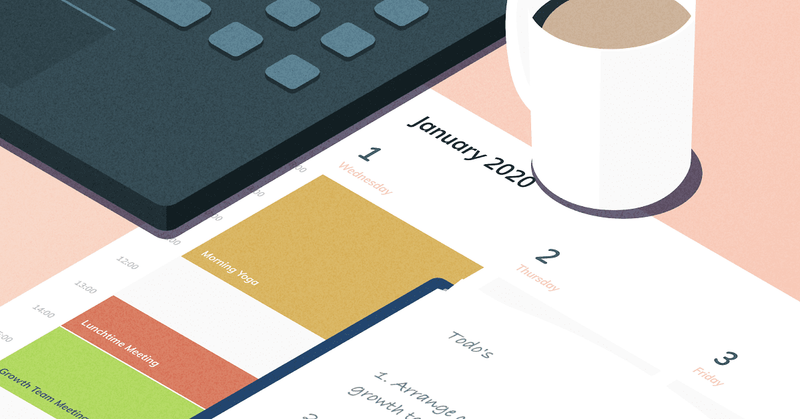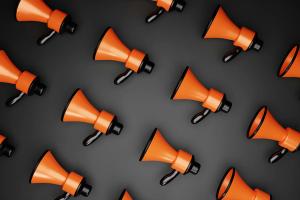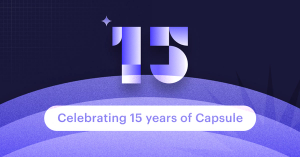Plan to prepare or prepare to fail. The adage is true — organization is key to staying productive, reducing stress, and hitting your targets.
But staying on track isn't always easy. Getting sidetracked by new tasks can lead to forgetting important tasks, or worse, missing crucial deadlines. Here at Capsule we know a thing or two about getting organized, so we asked our team to share their best tips for staying on track and keeping everything in order.
Here’s our top advice for getting organized and making the most of your time.
Understand your role and what’s expected
This may seem obvious, but this really helps being organized in the workplace. Understanding what’s expected of you and your role makes it easier to prioritize your workload.
Your organization might make business plans a year in advance, so try breaking these goals down into smaller, more attainable steps. Knowing your contribution ensures you're focused on the right things each day.
Tracking your progress is essential. Being able to accurately track tasks and monitor deadlines ensures that nothing is missed and you can make the most of every opportunity.
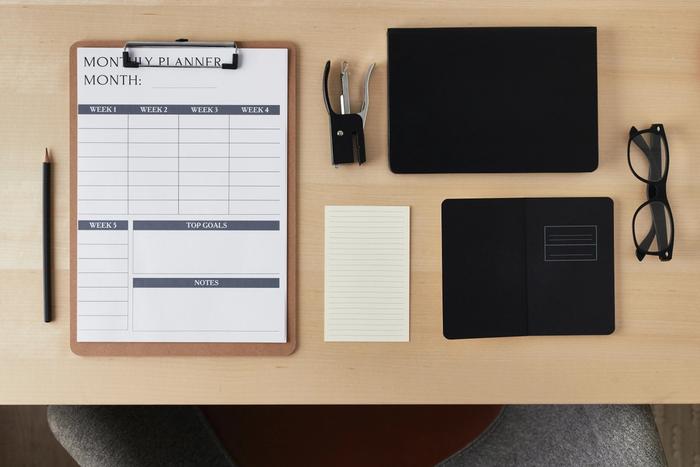
Harry Thomson Account Executive
"If it’s not logged in Capsule, it doesn’t exist. I track every call, every follow-up, and even those ‘just checking in’ emails. Future me is always glad that I’m staying on top of my tasks."
Discover 7 tips for sales pipeline success. Read more
Set clear and realistic goals for the week
Depending on your business, this could be for the week or month ahead. Setting SMART (Specific, Measurable, Achievable, Relevant, and Time-bound) goals helps maintain clarity and makes your goals realistic. By breaking down objectives into manageable steps, employees can focus on key priorities and maintain productivity. With Capsule, you can further enhance task organization by allowing users to track overdue, current, and upcoming tasks directly from the dashboard. This ensures that important responsibilities are not overlooked and provides a clear overview of workload distribution.
Capsule’s integrations can automatically create tasks, from a website contact form or Mailchimp Webhook, ensuring all contact details are up to date. The Calendar & Tasks tab provides flexible viewing options, allowing users to plan their workload by dragging tasks between days or filtering them based on status, owner, or category. Daily email task reminders help employees stay on top of deadlines, preventing tasks from piling up and ensuring smooth workflow management. This systematic approach makes it easier to track progress and meet goals efficiently.
Olivia MacCunn - Product Content Manager
"I swear by my to-do list, it’s like a survival guide. Every morning, I jot down my top three must-dos for the day, everything else I get done is just a bonus! It keeps me sane and helps keep tasks moving.”
Focus rather than multi-task
While it may seem productive, multitasking often reduces efficiency, increases errors, and can lead to mental fatigue. Dividing attention between multiple responsibilities may result in lower-quality work and slow progress.
Instead, focus on one task at a time and allow for deeper concentration, improved problem-solving, and higher overall productivity.
Prioritizing tasks, setting realistic deadlines, and breaking larger projects into smaller steps can help maintain focus and reduce the urge to multitask. Tools like task lists, calendars, and reminders help clarify what needs to be done. This ensures that important responsibilities are completed efficiently.
Schedule dedicated time blocks for specific tasks, minimizes distractions and allows for a more intentional workflow. By focusing on one task at a time rather than switching between multiple tasks, individuals can enhance their efficiency, reduce stress, and produce higher-quality results.
Charlotte Lloyd - Customer Success Manager
"I batch my tasks to make the most of my time. Mornings are for meetings and afternoons for dealing with customer calls, and emails. This keeps my brain from jumping all over the place and helps me focus on the task at hand.”
Discover how to automate your workflows. Read more.
Choose the right tools to keep you on track
You're not short of options when it comes to organization tools, but rather than juggling multiple platforms, it's often best to maximize the capabilities of a single. Before you adopt new software, take a look at the specific features you need to help streamline your workflow and save yourself valuable time.
Capsule CRM can help you create a smoother, more efficient workflow that keeps everything organized in one place.
- Automate workflows – Eliminate repetitive manual tasks and ensure nothing is missed
- Set up task reminders and follow-up alerts – Stay on top of key opportunities without missing deadlines.
- Use AI-powered customer segmentation – Automatically organize contacts based on interaction history and engagement levels.
- Collaborate seamlessly – Assign leads, tasks, and deals to team members, ensuring clear accountability.
- Reduce platform overload – Consolidate your tasks and alerts into one system to minimize switching between multiple tools.
By consolidating tasks and alerts into a single platform like Capsule, you reduce the need to switch between multiple tools, making your workflow smoother and more productive.
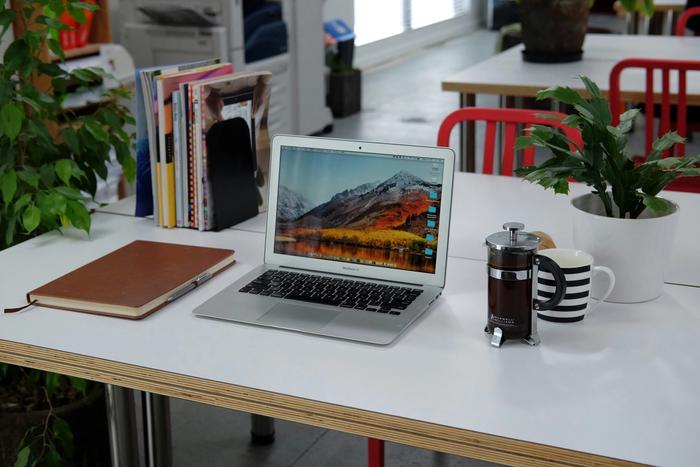
Minimize distractions
Removing distractions is one of the most effective ways to improve focus and productivity. While some interruptions are unavoidable, many can be managed by setting clear boundaries. Rather than constantly reacting to every email, Slack message, or notification, try scheduling specific times during the day to check and respond to messages.
Studies show that it takes an average of 25 minutes to regain focus after an interruption, so minimizing unnecessary distractions can significantly enhance deep work sessions.
Meetings are another common productivity killer. Over 83% of employees spend up to one-third of their work week and yet 64% of meetings don’t even have an agenda.
Before attending a meeting, consider if your being there is essential. If you’re organizing one yourself, set a clear agenda and invite only crucial participants. Every minute saved adds up and helps you and your team maintain focus and productivity.
Host meetings that create innovation, not distraction. How to avoid a total snooze fest.
Clear your desk for a clear mind
Clutter can drain your focus and productivity. A study from the Princeton Neuroscience Institute found that visual clutter competes for your attention, making it harder to concentrate and process information effectively.
When your workspace is disorganized, your brain has to work harder to filter out distractions, leading to mental fatigue and decreased efficiency.
The solution? Start by removing unnecessary items from your desk, keeping only essential tools and documents within reach.
A clean and organized space reduces visual distractions and makes it easier to focus on the task at hand.
If paperwork tends to pile up, consider digitizing important documents and using cloud storage or a CRM system to keep everything accessible but neatly stored.
An overflowing inbox, scattered desktop files, and a cluttered task list can also create a mental overload. Regularly clean up your email by archiving or deleting unnecessary messages, organize your digital files into clear folders, and streamline your task management system to ensure you can quickly find what you need.

James Keeler - Customer Success Manager
"Sticky notes and color-coded calendars are my best friends. If my workspace looks chaotic, my mind feels chaotic. So I keep things visually clean, including my to-do list."
Take plenty of breaks
When you turn off notifications and focus on deep work, hours can fly by. But the brain only works optimally for around 90 to 120 minutes before fatigue sets in.
Taking at least a 20-minute break afterward helps recharge your mental energy. Use your break to take a walk, chat with colleagues, or step outside for some fresh air.
The key is to make breaks intentional rather than simply switching to another mentally demanding task. Stepping away from screens, engaging in light physical activity, or even practicing mindfulness can improve focus and prevent burnout. Short, regular breaks throughout the day not only enhance productivity but also support long-term well-being by reducing stress and improving overall job satisfaction. When you return to work after a proper break, you'll feel refreshed, more creative, and ready to tackle the next task with renewed focus.
Need more time to get things done? Discover the top benefits of CRM for small businesses.
Review your success at the end of the week
Once you’ve changed your approach and optimized your workflow, you’ll feel more organized and hopefully more in control, but how do you measure success? Take 15 minutes at the end of each week to review your accomplishments. Reflect on what worked well and what could be improved for the following week.
Use this time to assess whether your tasks aligned with your goals and identify any bottlenecks that slowed you down. Did certain distractions keep creeping in? Were there tasks that took longer than expected? Adjusting your approach based on these insights helps you refine your workflow, making each week more productive than the last. A structured review process ensures continuous improvement and helps you stay on top of your workload with greater ease.
Wrapping up
Staying organized is about working harder not smarter. Set clear goals, break them into manageable tasks, and track your progress. Minimize distractions, declutter your workspace, and schedule regular breaks to stay focused and productive. A structured approach ensures you stay in control of your workload without feeling overwhelmed.
With Capsule, organization is effortless helping you manage tasks, automate workflows, and keep important information in one place.
Try Capsule CRM free for 14 days and take the first step toward a more streamlined, stress-free workflow.
Frequently Asked Questions
Decluttering your physical and digital spaces can help you become more focused and productive. Using a planner, either digital or physical can help you keep track of tasks, deadlines, and appointments so nothing is forgotten. CRM software can help you establish this routine and create a structure that prevents last-minute scrambling. Consistency is key. Once you create an efficient system, stick to it and refine it as needed.
Struggling to be organized often stems from a lack of structure or clear systems to follow. When there is no designated place for things or a proper routine in place, it becomes difficult to maintain order. Procrastination also plays a big role, as delaying tasks can lead to clutter and unfinished responsibilities piling up. Feelings of being overwhelmed can make organization seem like an impossible task, especially when there are too many responsibilities and no clear prioritization.
Start by identifying where the problem lies. Whether it's time management, maintaining a tidy space, or keeping track of important tasks. Once the problem areas are clear, developing better habits gradually can make a big difference. For example, starting small by organizing a desk or setting a specific time each day to clean up can build momentum. Using tools like planners, reminders, and apps can help manage tasks more efficiently. Creating simple and realistic systems, such as labeling storage spaces or using folders for important documents, makes organization easier to maintain. Setting achievable goals prevents feeling overwhelmed, and making a conscious effort to be consistent ensures long-term success.
One clear sign of disorganization is constantly losing or misplacing items. If you frequently spend time searching for keys, important documents, or your phone, it may indicate that there is no proper system for keeping track of things. Another common sign is missing deadlines and appointments. Forgetting important dates, struggling to complete tasks on time, or frequently feeling rushed are indicators of poor planning and time management. Both of these can lead to increased stress and inefficiency in daily life.
